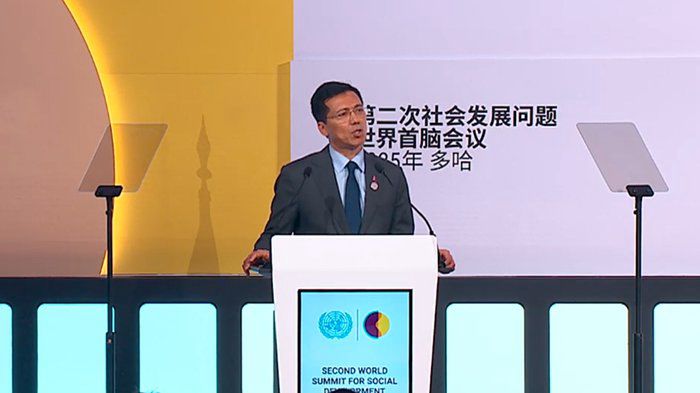
Since the Copenhagen Summit, 30 years ago, the world has seen extraordinary social and economic progress. People are healthier, more educated, and more connected than ever before. Yet we are still far from reaching the SDGs. Only 35 per cent of SDG targets are on track. And governments are grappling with diminishing opportunities for meaningful employment, widening inequalities, and growing insecurity. On this, the Doha Declaration is a milestone. It underscores the urgency of strengthening the social dimension of sustainable development. And, it calls for action on three interrelated priorities: ending poverty, ensuring full and productive employment and decent work for all, and promoting social inclusion.
Over 800 million people still live in extreme poverty. In addition, billions live very close to the poverty line. Even a minor shock—a sudden illness, an unexpected expense, the loss of a job, or a climate-induced disaster- can send them into poverty. Informal employment continues to affect over 80 per cent of workers in Africa and almost 70 per cent of workers in Asia.
Income and wealth are increasingly concentrated at the top. Today, the world’s richest one per cent of the population own more wealth than 95 per cent of humanity. Despite progress, nearly half of the total global population remains uncovered by social protection. They are living without the safety nets that cushion shocks, preserve dignity, and enable resilience in the face of crises.
And societies are increasingly divided and polarized. Confidence and trust in institutions seem to be eroding. Distrust, fueled by misinformation and disinformation, fractures social cohesion and undermines our ability to achieve the Sustainable Development Goals. Addressing these myriad issues lies at the heart of the mandate of the Economic and Social Council.
The 80th anniversary of the Council is an opportunity to renew our joint commitment to its enduring values – cooperation among nations, inclusive development, and the dignity of every person. Those principles have guided the Council since 1945. They continue to define our work today. The five-year review process agreed in the Doha Declaration provides an important opportunity to measure progress and renew momentum. The General Assembly will lead that effort, and the ECOSOC system will support it by bringing together governments, the UN system, and stakeholders to translate shared commitments into actions.
The role of the Commission for Social Development will be pivotal in this regard. We should spare no effort in strengthening it. ECOSOC’s forums and segments provide important opportunities to connect global policy with action on the ground. Under Nepal’s presidency, ECOSOC is advancing global cooperation on food systems, financing for development and climate resilience, and digital inclusion and youth entrepreneurship – issues that underpin poverty eradication, decent work and social inclusion. Our policy guidance supports implementation at the local, national, and regional levels, strengthening governments’ efforts.
The UN system’s analytical and evidence-based support runs throughout the Council’s work. And by providing space for the diverse voices of stakeholders, including youth, women and persons with disabilities, we ensure that our deliberations are rooted in the realities on the ground. These strengths will be fully mobilized to advance the commitments we make here in Doha. ECOSOC will continue to work with Member States, the UN system and partners to ensure that the Doha Political Declaration translates into tangible progress in people’s lives.
Let us carry forward the spirit of Doha — with unity of purpose and a shared determination to build societies rooted in dignity, opportunity and inclusion for all.
(The article is an edited version of the opening statement of the President of ECOSOC, Ambassador Lok Bahadur Thapa, during the Second World Summit for Social Development on 4 November 2025 in Doha, Qatar.)